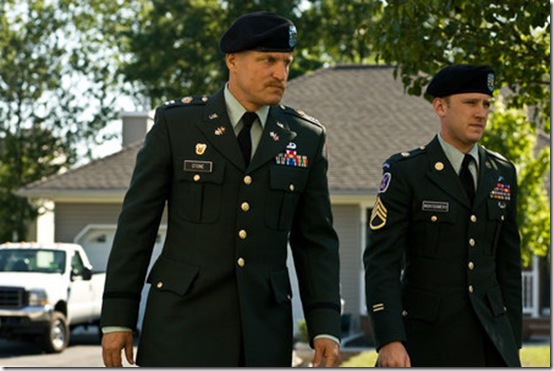It continues to appear as if The Hurt Locker is 2009’s sleeper candidate for top awards stardom, and I couldn’t be happier for director Kathryn Bigelow – not just because she made such a great, deserving film but because she helped reorient the war drama into more intensely personal, less ideologically pandering terrain (Avatar notwithstanding).
Just a couple of years ago, the conventional wisdom on war films was that they were box-office suicide, and certainly the poor receipts of Rendition, Redacted, Grace is Gone and In the Valley of Elah attest to this. But the collective shrug they garnered from moviegoers has less to do with the failure of a time-honored cinematic tradition than it does their inability to rise above politically simplistic screeds.
When war films are done right – as with the current spate of them, including The Hurt Locker, Brothers and now The Messenger – the broad strokes of anti-war politics are tangential to the individual, personally felt experiences of death, grief, outrage and sorrow, both “over there” and at home.
The Messenger, which belatedly opens Friday in South Florida, centers on young sergeant Will Montgomery (Ben Foster), just returning from a tour in Iraq and assigned to Casualty Notification service, despite having no experience in grief counseling. It’s not necessary, so he superiors say: It’s just a matter of memorizing a script. To help him learn the craft, he’s trained under the wing of hardened officer Tony Stone (Woody Harrelson), a recovering alcoholic and Desert Storm vet.
The dynamic is not unlike the central one in Up in the Air, albeit on a much more tragic scale: Seasoned veteran teaches young protégé how to deliver life-altering news to people at their most vulnerable times, and in turn is subjected to all manner of unpredictable reaction, from retaliatory violence to cool dispassion.
The scenes in which Will and Tony report the deaths of fellow servicemen to their new widows and parents back home are shattering to watch, collectively conveying an honest swath of war families (notice the high number of poor and minority families). Director and co-screenwriter Oren Moverman demonstrates how the mere shadow of two solemn soldiers on a suburban doorstep can turn the bitter domestic dispute inside into a universal grief session.
The scenes also prove, as in Up in the Air, that it’s nearly impossible to remain a mechanical, detached automaton when delivering the news. There is absolutely no physical contact with the next of kin permitted, Tony warns Will in the film’s opening moments, forecasting the ethical dilemma that will soon envelop Will when he forms a personal relationship with Olivia, Samantha Morton’s emotionally bruised war widow and now-single mother.
If the final third of The Messenger isn’t quite as moving as the opening two-thirds, it’s due mainly to the narrative’s more scattershot nature, which confuses the developing relationship between Will and Olivia and takes the story on a more rambling, less structured route.
The Messenger is Moverman’s first film as director, but he’s been an accomplished screenwriter on such diverse projects as the cult indie drama Jesus’ Son, the ‘50s-style melodrama Married Life and the schizophrenic Bob Dylan biopic I’m Not There. His latest film proves he belongs behind the lens, running the show.
A wonderful director of actors, Moverman excels at lingering on tragedy in painstaking, attention-draining long takes as both his tortured notifiers and their assigned cases unload their grief, current and past. He never lets us get comfortable. This is the cost of war, and he doesn’t permit us to look away, even to another shot within a scene. This noble, uncompromising film deserves a bigger audience than it’s likely to receive.
John Thomason is a freelance writer based in South Florida.
THE MESSENGER. Director: Oren Moverman; Cast: Ben Foster, Woody Harrelson, Samantha Morton, Jena Malone, Steve Buscemi, Lisa Joyce; Studio: Oscilloscope; Rating: R;
Opens: Friday at Sunrise Gateway, Fort Lauderdale and Jan. 22 at Regal Delray Beach 18.
